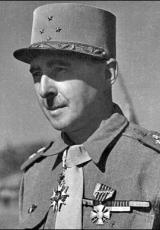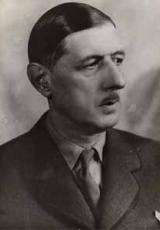Honoré d' Estienne d'Orves
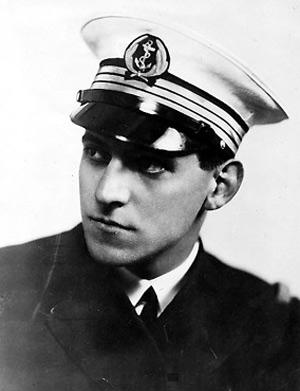
On the 30th August 1941 Parisians were to learn through the posting on walls of a yellow notice with a black border that the previous day, " Henri Louis Honoré, Count d'Estiennes d'Orves, a French citizen, born on the 5th June 1901 in Verrières " and sentenced to death for spying by the German court, had been executed by firing squad along with Maurice Barlier and Jan Doornik. D'Estienne d'Orves came from a long line of nobility: from an old family of Provencal origin, the d'Estiennes, on his paternal side and the Vilmorins on his maternal side, both legitimist families attracted by social Christianity. Study and leisure interests in equal measure filled a happy childhood: he passed his Baccalaureate in 1917 and prepared for Polytechnic in 1921, following time travelling in France and Europe. On leaving Polytechnic in August 1923, where his fellow students described him as an affable man with an enquiring and spiritual mind, he decided to serve in the Navy. In October 1923, he was a trainee on board the Jeanne d'Arc. Subsequent departures would take him to new horizons: from Brazil to China and from Morocco to Bali, each port of call was the opportunity to learn about and to try to understand the people and their culture.
In 1929, he married Eliane de Lorgeril, herself a descendant of Breton nobility. Five children would be born from this union. 1939: War broke out. Lieutenant of Vessel d'Estienne d'Orves found himself posted to the Duquesne onto the general staff of X Force who, under the orders of Admiral Godfroy, were to strengthen the British fleet of Admiral Cunningham in the eastern Mediterranean. The Armistice took place whilst the French were in Alexandria: a tacit agreement between the French and British admirals had avoided any confrontation between the former allies, but the French ships were immobilised. This predictable period of inactivity and the realisation that he could enjoy a certain amount of freedom on manoeuvres would lead d'Estienne d'Orves to pursue a career in action. This decision was a great wrench: he knew he would have to leave his family and his homeland far behind; his background, education and even his military status should have encouraged him to follow the path taken by most of his friends. However, he would write, "By continuing the fight, I thought I was acting in accordance with our traditions". And, under the pseudonym of Château vieux (from the name of one of his ancestors), he published a press release announcing the creation of the 1st Marine Group.
At the beginning of July 1940, d'Estienne d'Orves offered his services to General Legentilhomme, the commander of French troops in Djibouti, who announced his intention to ignore the Armistice, engaging the colony with him. With four other officers and marines, he reached Suez where he met Colonel de Larminat who had just gone over to the Free French. On the 23rd July, he disembarked from the Antenor in Aden to learn that Legentilhomme's project had failed. So D'Estienne d'Orves decided to go to Great Britain where French vessels were awaiting crews. Embarking on the 2nd August 1940 aboard an armed cargo ship, the Jehangir, d'Estienne d'Orves and his companions arrived in London at the end of September on board an ocean liner, the Arundel Castle, following an eventful journey along the African coast. He would never have the satisfaction of going back to sea in command on the bridge: the rearmament of the ships was in fact very slow and, in addition, he proved to be one of only a few officers of the Free French Naval Forces to have attended military college. On the 1st October 1940, he was promoted to Lieutenant Commander and was thus appointed to the 2nd bureau at general headquarters. The vital task of the information department of the Free French was to concentrate on the occupied country: to discover the movement of enemy troops, the location of aerodromes and the positions of batteries etc. Several missions had already been sent to the French coast with this objective. Having become the assistant to Colonel Passy, the head of the B.C.R.A, d'Estienne d'Orves laid the foundations for a network known as "Nemrod". On the 6th September 1940, Maurice Barlier was the first agent to reach France; Jan Doornick was to follow on the 1st October.
But d'Estienne d'Orves soon wanted to be on hand himself in order to coordinate the action of his men, establish vital contacts and recruit other agents. That was when he took over the department, Passy having been assigned temporarily to other duties. Was it wise to send the head of the secret service into already occupied France? Even Passy doubted deep down that this fundamentally straightforward man, with his confident nature, was suited to clandestine work. But General de Gaulle agreed: On the 21st December 1940, the trawler "Marie-Louise" left Newlyn, in Cornwall, with d'Estienne d'Orves - now "Jean-Pierre" - and Alfred Geissler, a young radio operator from the Alsace known as "Marty", onboard. They arrived the same evening not far from the Pointe du Raz, to be accommodated in Chantenay, near Nantes. Contact was made with members of "Nemrod" in Lorient and Nantes. On the 25th December, the first radio link between occupied France and London was established. Barlier's mission was to prospect in the Bordeaux region, with d'Estienne d'Orves taking care of the North and the Paris area. On the 27th December the latter was in Paris, where he met pioneers of the Résistance movement. From Brittany "Marty" regularly sent important messages back to London. However, he strangely proved to be both a drinker and a gossip. On returning from Nantes on the 19th January 1941, "Jean-Pierre" decided to bring him back with him to England. But "Marty", the son of a pro-Nazi Alsatian and himself a Germanophile, had that very day already made contact with the German counter-espionage service, providing the names of the 34 members of the network. Indeed, arrests were to follow - d' Estienne d'Orves was arrested during the night of the 21st to the 22nd January - whilst "Marty" sent false messages to London until the February. The prisoners were successively transferred to Nantes - where they were subjected to their first interrogations - to Angers, Paris and Berlin, before being incarcerated once more in Paris on the 26th February at the Cherche-Midi prison. On the 13th May 1941 his trial began, as did that of 26 of his companions. It would last 12 days. D'Estienne d'Orves covered for his fellow prisoners. The military judges would pronounce 9 death sentences and other prison sentences, whilst, remarkably, also paying tribute to the enemy. Appeals were lodged. The suspended sentence given to d'Estienne d'Orves in particular has been explained in different ways: some see it as the military commander in France, Von Stülpnagel's wish to wait for a spectacular opportunity to dampen spirits; others remember that the conviction stirred up strong feelings in the navy, in London and also in Vichy, to the point where Admiral Darlan intervened with the German authorities.
In Cherche-Midi and then in Fresnes prison, d'Estienne d'Orves read, meditated, prayed, wrote commentaries on the great literary classics and kept up the morale of his fellow prisoners. Above all, he wrote. His diary is a testimony, almost in the sixth religious sense of the term: he tells his nearest and dearest about his childhood, giving the example of a Christian and a soldier. Periods of hope and disappointment followed as the days passed. His lawyer, Oberleutnant Mörner, seemed confident. On the 21st August 1941 Midshipman Moser of the Kriegsmarine was killed in Paris in the Barbès-Rochechouart underground station. On the 22nd, General Schaumburg, commander of "Gross Paris", signed the order that would now turn the arrested Frenchmen into hostages. At the same time, the military commander in France, Von Stülpnagel, probably used the opportunity to make an example out of those prisoners already sentenced to death by executing them. On the 28th August 1941, d'Estienne d'Orves wrote to his sister about France, "I am dying (...) for her full freedom and hope that my sacrifice will be of some use to her".
"May nobody seek vengeance for me. I only wish for peace in the newfound greatness of France. Make sure to tell everyone that I am dying for her and for her full freedom and hope that my sacrifice will be of some use to her. I embrace you all with my everlasting tenderness. Honoré"
The following day, d'Estienne d'Orves, Barlier and Doornik - their 6 companions had been pardoned - were led to the fort at Mont-Valérien. It was a sunny morning. In front of the execution post, the marine officer remained steadfast, publicly pardoning his judges. He had written: "Don't hate anyone because of me - everyone has done his duty for his own country. Learn instead to recognise and better understand the character of France's neighbouring people." At 6.30 am the three men were shot. D'Estienne d'Orves valued highly the duty to obey: However, he chose to disobey his superior officers in the name of an ideal, whereas he could easily have found a position in Marshall Pétain's France. But he could never consider that, convinced that a battle is never really lost whilst the possibility of free action exists. On the 11th March 1943, Aragon published his poem "La Rose et le Réséda" which tells of the common battle of "he who believed in Heaven and he who did not believe". D'Estienne d'Orves was the former.
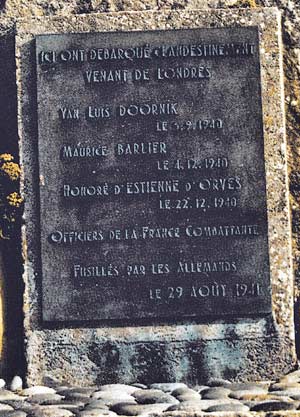
Plaque apposée à l'endroit où débarque d'Estienne d'Orves le 21 décembre 1940. Plogoff, Port-le-Bouz (Finistère). Source : SGA/DMPA
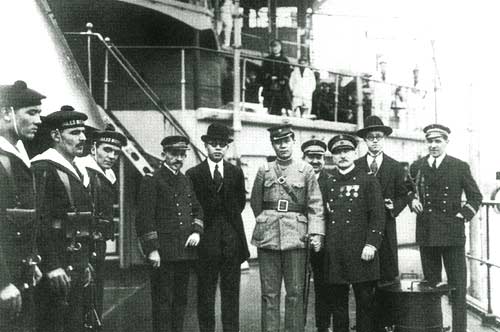
D'Estienne d'Orves en Extrême Orient. Source : Fonds d'Estienne d'Orves
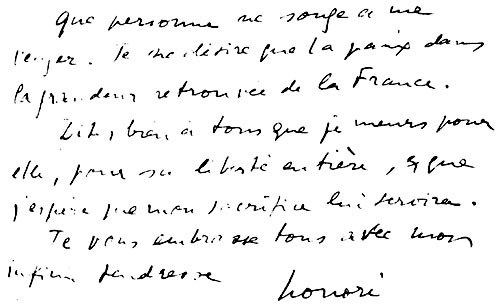
Extrait de la dernière lettre écrite par d'Estienne d'Orves. Source : Fonds d'Estienne d'Orves


